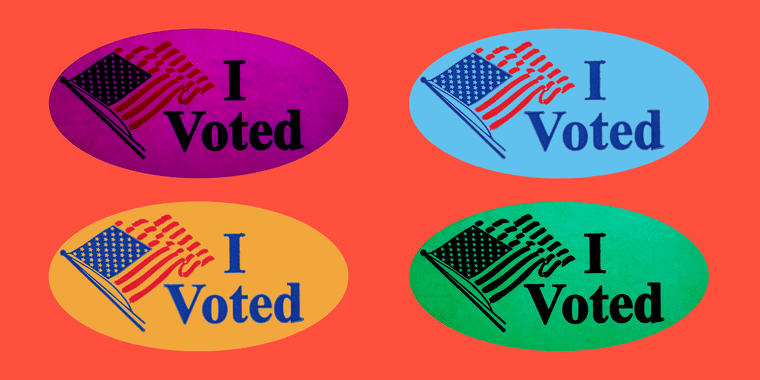In this year's presidential election, an analysis by Rutgers University projected that some 38 million people with disabilities are eligible to vote, representing nearly 1 in 6 of the total electorate. But people with disabilities often face obstacles to casting their ballots, from broken elevators at polling places to voting machines without any audio.
In fact, if the disability community voted at the same rate as the rest of the population, there would be 2.35 million more voters, according to 2018 research from Rutgers University.
Closing this gap by making these obstacles easier to navigate is the goal of a new app, called Brink Election Guide. It's billed as the first fully accessible voting app and includes polling locations, notifications with deadline reminders, nonpartisan fact sheets on local candidates and more. Their website states that it works "offline in all 50 states, in multiple languages, and includes many accessibility features to support a wide variety of needs."
"This information we're providing is not designed to gear anyone to vote in one direction or the other," Brink founder Dylan Bulkeley-Krane told TODAY. "It just allows people to have accessible information to do their research before they vote."
Bulkeley-Krane said he started working on Brink back in 2017, when it seemed like the rights of the disability community were on the brink of going mainstream, the inspiration for the app's name. But in the 2019 Democratic primaries, he noted, not one of the candidates had a fully accessible website.
"Although a lot of these candidates had great disability-focused policy and hired disabled staffers, which are all key and important things, this last piece of using accessible tech is really missing from most of the outreach," he explained, adding that this applies to both politicians and voter-engagement organizations.
In conducting interviews with people with disabilities before building the app, Bulkeley-Krane, who lives with an invisibility disability, quickly learned that many of the barriers for these voters occur at the polling place. That was the inspiration for the part of the app that has garnered the most positive feedback — the voting rights script.
"It's the ability for people to read and think about what are those potential problems before they get there, so if they do run into an issue, they know what to say, they know who to call. It's less scary," he said. The app also has checklists that guide first-time voters, especially those with intellectual disabilities, through the process of registration and afterward.
Since the app launched two weeks ago, downloads per day have been steadily increasing, Bulkeley-Krane said, and he expects total downloads to double by Election Day.
Colleen Flanagan, who lives in Boston, said she used the app to early vote, and even though she's politically engaged, it provided "helpful resources that haven't been there before," she said.
"There's a lot of unexpected barriers that happen when you're living with a disability because we're living in an inaccessible world," Flanagan told TODAY, calling the script a "go-to for when things are not accessible, when you know they are supposed to be and that they can be."
"It was a tool we could use to make sure what was supposed to be accessible really was," she added.
Flanagan said the app's so effective in large part because it was built by people with disabilities. "(They) know what the access barriers are, so to be able to make a plan to vote this time around with legit resources that were created by people with disabilities was very empowering," she said.
The app has a handful of positive reviews in the app store as well: "... as a person with a disability who is a vulnerable risk in these times of COVID-19 The developers have made it very easy for me to include my vote in this year‘s presidential election," one user wrote. "... for that I will be forever grateful for giving me that freedom with such a simple app as this."
Even though people with disabilities are often left out of conversations about voter suppression, Flanagan wants to stress to fellow members of the disability community that their votes matter.
"No access barrier or an attitudinal barrier should stop you from voting," she said. "And if you have any questions ... look at the Brink Election Guide."


